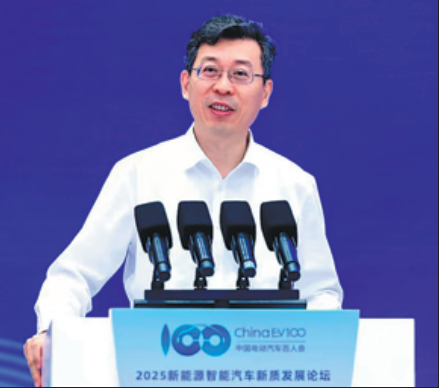Don't take foot off gas with AI, says think tank

As the global automotive industry intensifies its focus on intelligent technology, China must accelerate breakthroughs and ecosystem development to maintain leadership in key application areas, an industry think tank said.
Zhang Yongwei, secretary-general of the China EV 100, highlighted China's progress in automobile intelligence at an industry forum in Changchun, Jilin province, on July 15.
He noted that vehicles equipped with Level 2 driving-assist systems now account for more than half of the Chinese auto market, ranking first globally. And the adoption of new advanced technologies such as intelligent parking has surged to more than 20 percent in mid to high-end vehicle models.
The deep integration of new driving assistance technologies during vehicle research and development is seen as a hallmark of innovation in China's auto sector, Zhang said. Tech companies like Huawei, Momenta, and DeepRoute.ai are collaborating closely with automakers from the earliest development stages.
He outlined key targets of China's intelligent vehicles: between 2025 and 2030, there will be a rapid push to popularize advanced driver assistance systems, expand the user base, and cultivate a culture of intelligent driving. The focus will also be on advancing to Level 3 and higher autonomous driving capabilities.
He forecast that between now and 2030, there exists an opportunity for the Chinese auto sector to propel Levels 3 and 4 autonomous driving toward widespread implementation.
"If we decelerate, our previous advantages could be overtaken," he said. While China leads in the number of vehicles with driving assistance features, the United States holds advantages through Tesla's Full Self-Driving system, Nvidia's high-performance chips, and cockpit solutions from Qualcomm and Android.
Zhang noted significant shifts in vehicle cost structure. Mechanical hardware costs, once 70 percent of an internal combustion engine vehicle, have fallen below 50 percent and are projected to drop to under 30 percent soon. Conversely, by 2030, electronic hardware costs are predicted to rise to 70 percent of total vehicle cost, with software and artificial intelligence gaining critical importance.
Consumer demand mirrors this shift. Cost factors weigh around 60 percent in purchasing decisions, while intelligent features now influence 54 percent of buyers, underscoring the necessity for companies to prioritize intelligence and AI to win consumer approval.
Zhang predicted that automakers' AI development will evolve in three stages: using AI to assist R&D and management; producing intelligent products like AI-driven cars; and transforming into full AI companies capable of developing a suite of products.
Du Qiang, president and CTO of Neusoft Reach, said that AI has significantly affected the auto industry, vehicle experience, and core competitiveness over the past half year. "AI-powered tools and semi-automated development have greatly improved software development efficiency, reducing barriers and boosting productivity," Du said.
Gu Jianmin, CTO of Valeo China, said in addition to electrification, driving assistance, and smart cabins, in-car infotainment systems and personalized visual elements, such as headlights, are becoming more important.
An example is that headlights are no longer just lighting tools but essential carriers for design and information interaction. Behind all these technologies, software is becoming a crucial force in defining vehicles, Gu said.
Since 2024, almost all cockpit and driving assistance systems have integrated AI models, but this poses significant challenges for chips, operating system architectures, and application compatibility, said Zhou Shiying, vice-president of FAW's R&D institute.
Currently, most automakers have not fully achieved absolute separation of software and hardware, she added.





































